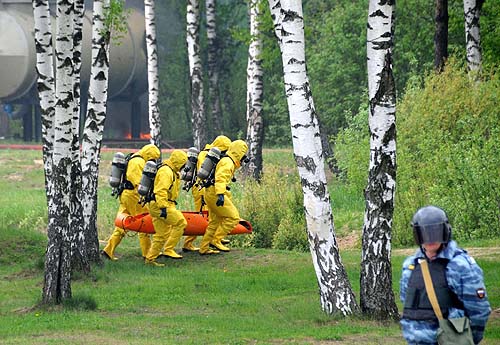|
Recently, the security situations in Afghanistan and Pakistan have deteriorated. Does the SCO have any intention to cooperate with the United States and its NATO allies in combating terrorism in these countries?
 |
|
FIGHTING FOR LIFE: Chinese rescuers enact an evacuation during an emergency exercise staged by response teams from SCO member states in Noginsk, Russia, on May 22, 2009 (GAO FAN) |
The SCO has established a liaison group to work with Afghanistan. By all accounts, the group is operating effectively. All SCO member countries have been actively engaged in antiterrorist cooperation from the very beginning, and this effort is no exception. Meanwhile, we are also seeking to join other broad international coalitions against terrorism.
Every member country has been making significant contributions to improving the security situation in Afghanistan through both economic cooperation and cultural support. Within the last three years, China and Russia have trained 118 professional antiterrorist personnel to help address the Afghan issue. All these are done in the interest of peace and stability in Afghanistan.
Furthermore, as secretary general, I would like to express support for the joint communiqué delivered at the International Conference on Afghanistan, which was held in London in January 2010. All foreign ministers of SCO member countries were in attendance.
Prior to the London conference, the SCO held a vice foreign ministers' conference on the Afghanistan in Moscow. Vice foreign ministers from SCO member countries coordinated their positions on Afghanistan at the conference. Their common position was later reflected in the joint communiqué of the London conference.
We are also keenly prepared to participate in the Kabul conference on Afghanistan, to be held later this year. We will also offer new proposals with which to help Afghanistan achieve peace and stability.
Against the backdrop of the economic crisis, has the annual budget of the SCO been reduced? How many staff members does it have now?
It was agreed last year that budget of the SCO Secretariat and the Regional Antiterrorism Structure would be increased. We do not have any budget reduction plan at the moment. The SCO adopts a membership due system, under which all members pay their dues according to their own financial capacity.
We have no intention to reduce the personnel of the SCO Secretariat or the Regional Antiterrorism Structure. Instead, we want to gradually increase the staff to enhance our working ability.
Currently, we have 30 staff members in the SCO Secretariat sent by the six member nations. They are divided into different departments based on their duties, not unlike other international organizations.
Will you consider admitting new countries to expand the SCO during your term of office? How will you seek to boost the profile of the SCO in the international arena?
Enlargement of the SCO membership is an important task for us both currently and in the long term. The SCO has set up an experts' panel to formulate principles and criteria with which to absorb new members.
Among these principles, the accession of new members must be conducive to the consolidation and unity of the entire organization. Currently, the SCO is actively studying the applications of Iran and Pakistan.
Against the backdrop of globalization, the SCO is not only a regional organization but also has secured an increasingly important role in the international arena. Many international organizations are showing interest in our activities.
Not long ago, I participated in a conference of regional international organizations held by the UN Secretariat. At the conference, we communicated with representatives of other organizations such as NATO. UN Secretary General Ban Ki-moon, for one, said he had particularly great expectations for us, adding that the SCO has played a critical role in resolving a number of major regional issues. | 